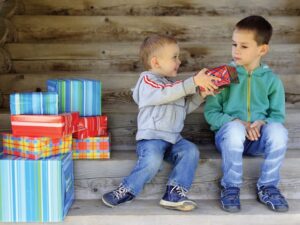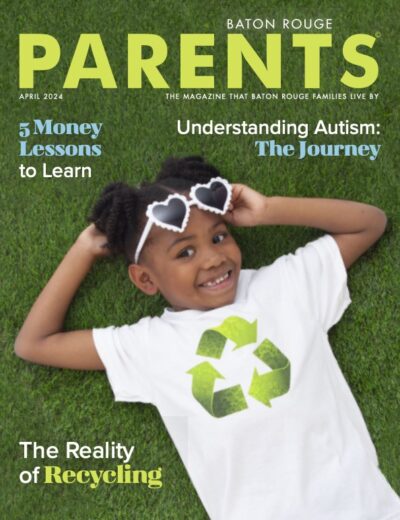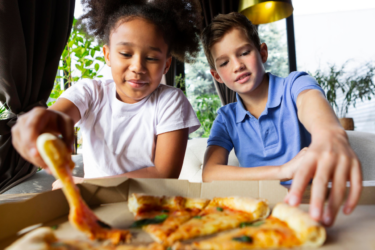
When Santa’s Not Fair
What’s the first thing you ask a child after Christmas? Did you answer, “What did Santa bring you?” or “What did you get for Christmas?” Chances are you did, and you’re not alone. After all, you’re guaranteed a smile. And the ultimate conversation starter. Our kids are happy and grateful, and we love to hear them regale us with their cheer.
But it’s a whole different ball game when our kids get together and Santa wasn’t exactly equal when he passed out the toys. When a four year old shows her friend her new dollhouse, she may not know her friend wanted one too but couldn’t get one this year.
Empathy: A Critical Milestone
Early childhood brings about the development of what psychologists call an emotional intelligence involving several stages that predict a child’s behavior in life. One of the critical stages is that of empathy. According to Baton Rouge clinical psychologist, Dr. Karen Speier, “Empathy is critical in everyday interactions, cooperation, and cultural learning. A child learns first by watching his parents’ attentiveness to the emotional needs of the child. Later, the child learns by watching his parents’ reactions to others.” A child perceives the verbal and nonverbal cues of the parents as they react to social needs of others, and the earlier emotional education begins, the better.
Dr. Speier states that many research studies are indicating that the level of empathy in children has decreased in the last 20 years. One area being studied extensively as a possible cause is the distance that has been created in peer interactions by increased electronic communications. Texting has become the primary mode of communication, and the result is they don’t see each other’s eyes, hear the tone of their voices, or pick up on other nonverbal and verbal cues that result from having physical interaction.
Dr. Thompson Davis III, licensed clinical psychologist and director of Psychological Services Center at LSU states that the self-conscious emotions of jealousy, shame and embarrassment surface around the ages of 2-2 ½ in children. However, children don’t know the context in which they should process these emotions appropriately. Instead, they often rely on the feedback and direction of their parents and caregivers.
By the Ages
Dr. Davis stresses that a warm, responsive attitude of parents is first. Secondly, parents need to exhibit confidence and control. Parents don’t have to have the right answer, but they do need to show they can be relied on when a child is confused. Consistency between a parent’s words and behavior is also a key factor. “I’d rather parents say, ‘Do as I say and do,’ rather than the old saying, ‘Do as I say and not as I do,’” says Dr. Davis.
Empathy and humility don’t come naturally in preschoolers developing social skills, but parents can begin the process before a child’s innocent delight becomes a target for jealousy. What begins as sharing can sometimes turn to outright bragging.
Dr. Davis suggests that setting expectations becomes important. When a child does act appropriately, parents must follow through with praise. “I tell parents to schedule social outings with their children and make it a positive experience. They get a chance to practice social behavior and establish a relationship that is really necessary for later lessons as well as the present,” says Dr. Davis.
By the time your child is in kindergarten, she’ll be comparing herself with others as a normal part of development. Children begin noticing differences in abilities, talents and appearances as they begin interacting with each other on a regular basis. Unfortunately, they also notice who has the most toys. A growing sense of materialism has entered their lives, and unless we take action now, possessions will trump empathy.
By ages five and six, children have not only developed a sense of equality, you’ll probably find they are becoming more competitive in their interactions with peers. “This is when a child announces his friend has more sprinkles than he does, and it isn’t fair,” Dr. Davis points out. The result is that bragging becomes common and more socially unacceptable.
Parents Can Help
So, what can you do to stop a bragging child before she finds herself playing on that jungle gym alone? First of all, be an example yourself. They really do notice how we talk about our own possessions to others. When our children see us bragging to our friends about our new cars and flat-screen televisions, it’s hard to teach them not to act this way themselves. As Dr. Speier points out, “If we don’t model what we teach, then we teach in vain.”
We can also teach our children gratitude. We can help them count their blessings and give thanks at our meals. Help them see how lucky they are by making charity a part of your lives. Gently teach your child that there are children who have less, and children who have more. Dr. Davis states that the character asset of “benevolence” comes in around the age of eight, so children feel compassion for someone who has less without judging the person’s worth.
Empathy: An Ongoing Process
However, as Dr. Davis emphasizes, developing empathy is an ongoing process and sooner or later, a child will probably cross the line from telling a friend about a new present to just downright bragging. If a child shows a need to one up her friends and never be outdone, it’s time to talk to your child. Many parents don’t realize that in their own efforts to reinforce their children and build their self-esteem, there are statements that carry the wrong message. Your child is not the best at everything, and telling her she is not only creates a little monster, but sooner or later your child will have to cope with others who may be better in some way.
Role-play with your child when you see patterns of bragging, and let her see how it feels to be the child with less.
Intervention is critical when behaviors are unacceptable. If you see your child pointing out to a friend that his toy is cooler or goes faster, it’s time to pull him aside and tell him the truth.
Empathy is a big word for them to learn, but lessons can begin as tiny steps. And like most things, they watch the steps we take first. ■





